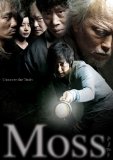| Reviews & Columns |
|
Reviews DVD TV on DVD Blu-ray 4K UHD International DVDs In Theaters Reviews by Studio Video Games Features Collector Series DVDs Easter Egg Database Interviews DVD Talk Radio Feature Articles Columns Anime Talk DVD Savant Horror DVDs The M.O.D. Squad Art House HD Talk Silent DVD
|
DVD Talk Forum |
|
|
| Resources |
|
DVD Price Search Customer Service #'s RCE Info Links |
|
Columns
|
|
|
Moss: Two-Disc Special Edition
Other // Unrated // August 21, 2012
List Price: $29.99 [Buy now and save at Amazon]
The Film:
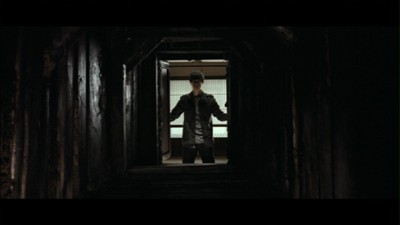 While director Kang Woo-suk has released a range of successful crime films since 2002, starting with Public Enemy , his style differs from the genre contemporaries emerging from South Korea at the time. His perspective slants towards quirkiness and humor, taking precedence over the modish, bleak grittiness common in many of the region's thrillers -- which is why Moss (Hangul) comes as a bit of a surprise. Adapting a webcomic of the same name by Yun Tae-ho, it's a stark, shadowy whodunit marathon about a rustic village built with the bricks of spiritual indoctrination and the demons of its citizens' pasts, allotting itself little downtime for anything upbeat in the midst of a deadly mystery. It's quite a puzzler, too: while overlong and overtly vague about the moral implications woven within, Kang Woo-suk adeptly combines an eerie mood, unsettling hostility, and mental turmoil within its disconcerting maze of twists and turns.
While director Kang Woo-suk has released a range of successful crime films since 2002, starting with Public Enemy , his style differs from the genre contemporaries emerging from South Korea at the time. His perspective slants towards quirkiness and humor, taking precedence over the modish, bleak grittiness common in many of the region's thrillers -- which is why Moss (Hangul) comes as a bit of a surprise. Adapting a webcomic of the same name by Yun Tae-ho, it's a stark, shadowy whodunit marathon about a rustic village built with the bricks of spiritual indoctrination and the demons of its citizens' pasts, allotting itself little downtime for anything upbeat in the midst of a deadly mystery. It's quite a puzzler, too: while overlong and overtly vague about the moral implications woven within, Kang Woo-suk adeptly combines an eerie mood, unsettling hostility, and mental turmoil within its disconcerting maze of twists and turns.
Ryu Hae-guk (Park Hae-il , War of the Arrows) is the one careening through the maze, the estranged son of one of the village's "founders". He receives an anonymous phone call notifying him that his father has passed of natural causes, leading him to the village to settle his estate. When he arrives, the greeting is less than courteous: police officers resist cooperating with his wish for an investigation into the "natural" death, the village insists that an autopsy isn't necessary, and, more importantly, everyone tries to get Ryu out of the village as quickly as possible. The peculiarity appears to lead back to Cheon (Jung Jae-young), an old, wealthy police chief pulling the strings who, gauging by the flashback at the beginning of Moss, has a convoluted relationship with Hae-guk's father -- one that hinges on verbal persuasion through pseudo-philosophical mind tricks. It's something Ryu wants to investigate for himself.
The town's oddness creates a vacuum that sucks Ryu Hae-guk, and the audience, into an elaborate channel of clues to follow, where we're chasing the promise of illumination about his father through dangerous circumstances and almost cult-like citizens that abide by some clandestine agenda. Kang Woo-suk creates a chilling atmosphere with Moss by provoking the senses inside this distress: visceral acts of violence methodically appear, often in the frequent flashbacks, while Hae-guk's travels across the town are bolstered by pulsing music, dim lighting, and the occasional craggy tunnel. Cinematographer Kim Sung-bok combines his steady-shot intimacy in My Sassy Girl with the occasional raw verve reminiscent of his work on Joint Security Area to lend vigor to the village's shadowy, earthen atmosphere, and when it's matched with Jo Yeong-wook's score, it's hard break free from the grip of danger coiled around the story.
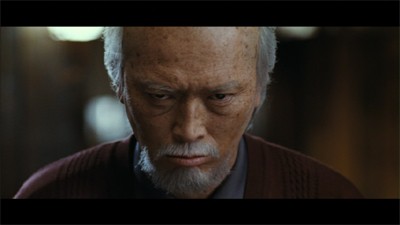 It doesn't take long for Hae-guk to unearth lies, paper trails, and skeletons in closets, all centered on the bizarre accord amongst the shifty-eyed townspeople that Moss slowly divulges. Bizarre happenings occur around Hae-guk that boost the intrigue, from the lurid relationship many of the town's men have with a conventional, pretty, buttoned-up woman to their peculiarly rigid reaction to an autopsy request. The power of any good mystery resides in how well it sustains a balance between revealing answers to quandaries about weird goings-on like these and leaving the audience asking, "But, why?" -- and Moss often successfully exploits this dangling uncertainty. Though the audience has a vague outline of the "how" through flashbacks centered on his father's persuasion and coercion, the material never idles long enough for someone to comprehend motivation or meaning behind the village's peculiarity.
It doesn't take long for Hae-guk to unearth lies, paper trails, and skeletons in closets, all centered on the bizarre accord amongst the shifty-eyed townspeople that Moss slowly divulges. Bizarre happenings occur around Hae-guk that boost the intrigue, from the lurid relationship many of the town's men have with a conventional, pretty, buttoned-up woman to their peculiarly rigid reaction to an autopsy request. The power of any good mystery resides in how well it sustains a balance between revealing answers to quandaries about weird goings-on like these and leaving the audience asking, "But, why?" -- and Moss often successfully exploits this dangling uncertainty. Though the audience has a vague outline of the "how" through flashbacks centered on his father's persuasion and coercion, the material never idles long enough for someone to comprehend motivation or meaning behind the village's peculiarity.
Obscurity becomes both a key asset and the chief frustration I have with Kang Woo-suk's work, where the story's pathos and underlying themes lock horns with his premeditated insistence on leaving certain elements unclear. The story makes a point of emphasizing the effectiveness of Hae-guk's father as an unremitting mental power who's able to convince others of his agenda of salvation, a form of indoctrination; however, Kang Woo-suk frames his persuasion in a way that almost seems unnatural, as if mystical forces control it. Whether it's other-worldly or merely the effect of his stoic, haunting gaze and grace with words remained a mystery, and that'd be fine in another setting. But as Moss pulls the curtain back on its mysteries -- and themes of corruptibility, redemption, and ethical leverage become an important ideological thrust behind what's happened -- it culminates in a cluttered moral perspective that undermines the philosophical and institutional points it'd potentially make, failing to measure up to the likes of Sympathy for Mr. Vengeance or Memories of Murder in critiquing a moral gray area.
Instead, the confused intellectual aspects at the core of Moss are mostly reduced to superficial discoveries unearthed from Ryu Hae-guk's sleuthing , a set of machinations built around murders, real-estate dealings, and other back-stabbing endeavors that confidently keep those watching on their toes. Indeed, the mystery sustains its energy through a nearly three-hour span, where compelling performances from seasoned Korean actors, including a barefaced Park Hae-il as Hae-guk and Jeong Jae-yeong in dual-aged roles, elevate the film's twisting discoveries and brooding essence until the grand revelation of the village's truths -- the end of the maze. Yet, the nonstop energy has a lingering effect once it reaches a rash, somewhat forced conclusion: the longer the warped mystery endured, the more thematically lucid the revelation needed to be at the end of Ryu's inspection. And while digging through the puzzling layers of Moss can be enthralling, the outer layers flourish much more than what's at the center of it all.
The DVD:
Video and Audio:
Rich greens, browns and blacks dominate the image in Moss, something I suppose one could expect given the title. What you might not expect is exactly how proficient this DVD can be: frequently, the 2.35:1-framed transfer sports excellent amount of detail, ample skin-tone balance, and a graceful range of motions through the image. A few close-ups are jaw-dropping, revealing the intricacy of the elder-driven make-up work, while daytime sequences often showcase robust detail and a capable eye for contrast. Now, during the nighttime sequences, contrast can get a bit muddy, obtrusive, and grainy, and some details appear flat to the eye, but all in all, we're working with a rather robust transfer here.
The Korean 5-channel Dolby Digital track isn't a slouch, either. Mostly a dialogue-driven film, Moss balances the often brusque, fluctuating dialogue with a capable grasp on the soundstage's breadth, frequently melding with background ambience to immensely successful ends. Occasional sound effects push through the front- and rear-channel arenas, such as billowing fire and the splashing of water, but mostly the track here focuses on staying clean and clear for the ebb-'n-flow of verbal clarity to stay stable. That, and the robust soundtrack, which becomes the audio design's most prominent source of lower-frequency activity -- often pulsating on the lower-end of things. Some vocal elements get hampered down by the track's limitations and a few effects feel a bit flat, but aside from that, it gets the job done rather well. The English subtitles are exceptionally well-handled, with nary an instance of grammatical issues to be found.
Special Features:
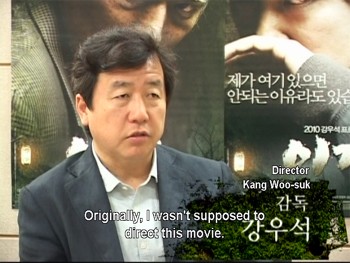 The Making of Moss (1:03:02, 4x3):
The Making of Moss (1:03:02, 4x3):
As with most of these lengthier pieces, expansive behind-the-scenes stretches are edited together with interviews with the cast and crew. The content stays mostly on the surface, really, but there's a bit of material worth really paying attention to, such as when Yun Tae-ho discusses the diverting directions of the material and how Kang Woo-suk stayed the course with his vision -- making sure it didn't "wander off". You'll see the director at-work in the off-camera shots, as well as the make-up effects applied to Jeong Jae-yeong to give him his elder appearance.
A series of other featurettes touch on various topics about Moss: The Comic Behind the Story (4:48, 4x3) discusses the path artist Yun Tae-ho traveled from learning about Kang Woo-suk to being assured he was the right director; Art and Set Design (7:21, 4x3) reveals some of the extensive set construction and detailing; and Make-Up and Effects (8:36, 4x3) mostly covers the transformation of the actors from the young versions of themselves to the elder versions. Also available are a video capturing the Poster Shoot (2:25, 4x3) for the film's eerie promo materials, Cast and Director Bios, and an Original Teaser (:50, 4x3) and Original Trailer (1:14, 4x3).
Final Thoughts:
Moss is a rich, complex mystery-thriller about persuasion, morality, and hidden secrets tucked away in a village that's willingly separated from the rest of the world. The pacing never halts across its over two-and-a-half hour time with the audience; sporting an eerie, kinetic energy driven by the village' mysteries and the main character's push to unearth them, Kang Woo-suk's adaptation of a Korean webcomic sustains a constant, compelling stream of intrigue from start to finish, even though it's unable to fully resolve the hard-hitting themes of cultish indoctrination and redemption that it prances around. Deft performances and an unyielding atmosphere boost its energy all the way to its jumbled climax. Definitely worth the time, though it doesn't pack the same punch as some of its grittier, more provocative and stimulating contemporaries. Recommended.
Thomas Spurlin, Staff Reviewer -- DVDTalk Reviews | Personal Blog/Site
 While director Kang Woo-suk has released a range of successful crime films since 2002, starting with Public Enemy , his style differs from the genre contemporaries emerging from South Korea at the time. His perspective slants towards quirkiness and humor, taking precedence over the modish, bleak grittiness common in many of the region's thrillers -- which is why Moss (Hangul) comes as a bit of a surprise. Adapting a webcomic of the same name by Yun Tae-ho, it's a stark, shadowy whodunit marathon about a rustic village built with the bricks of spiritual indoctrination and the demons of its citizens' pasts, allotting itself little downtime for anything upbeat in the midst of a deadly mystery. It's quite a puzzler, too: while overlong and overtly vague about the moral implications woven within, Kang Woo-suk adeptly combines an eerie mood, unsettling hostility, and mental turmoil within its disconcerting maze of twists and turns.
While director Kang Woo-suk has released a range of successful crime films since 2002, starting with Public Enemy , his style differs from the genre contemporaries emerging from South Korea at the time. His perspective slants towards quirkiness and humor, taking precedence over the modish, bleak grittiness common in many of the region's thrillers -- which is why Moss (Hangul) comes as a bit of a surprise. Adapting a webcomic of the same name by Yun Tae-ho, it's a stark, shadowy whodunit marathon about a rustic village built with the bricks of spiritual indoctrination and the demons of its citizens' pasts, allotting itself little downtime for anything upbeat in the midst of a deadly mystery. It's quite a puzzler, too: while overlong and overtly vague about the moral implications woven within, Kang Woo-suk adeptly combines an eerie mood, unsettling hostility, and mental turmoil within its disconcerting maze of twists and turns. Ryu Hae-guk (Park Hae-il , War of the Arrows) is the one careening through the maze, the estranged son of one of the village's "founders". He receives an anonymous phone call notifying him that his father has passed of natural causes, leading him to the village to settle his estate. When he arrives, the greeting is less than courteous: police officers resist cooperating with his wish for an investigation into the "natural" death, the village insists that an autopsy isn't necessary, and, more importantly, everyone tries to get Ryu out of the village as quickly as possible. The peculiarity appears to lead back to Cheon (Jung Jae-young), an old, wealthy police chief pulling the strings who, gauging by the flashback at the beginning of Moss, has a convoluted relationship with Hae-guk's father -- one that hinges on verbal persuasion through pseudo-philosophical mind tricks. It's something Ryu wants to investigate for himself.
The town's oddness creates a vacuum that sucks Ryu Hae-guk, and the audience, into an elaborate channel of clues to follow, where we're chasing the promise of illumination about his father through dangerous circumstances and almost cult-like citizens that abide by some clandestine agenda. Kang Woo-suk creates a chilling atmosphere with Moss by provoking the senses inside this distress: visceral acts of violence methodically appear, often in the frequent flashbacks, while Hae-guk's travels across the town are bolstered by pulsing music, dim lighting, and the occasional craggy tunnel. Cinematographer Kim Sung-bok combines his steady-shot intimacy in My Sassy Girl with the occasional raw verve reminiscent of his work on Joint Security Area to lend vigor to the village's shadowy, earthen atmosphere, and when it's matched with Jo Yeong-wook's score, it's hard break free from the grip of danger coiled around the story.
 It doesn't take long for Hae-guk to unearth lies, paper trails, and skeletons in closets, all centered on the bizarre accord amongst the shifty-eyed townspeople that Moss slowly divulges. Bizarre happenings occur around Hae-guk that boost the intrigue, from the lurid relationship many of the town's men have with a conventional, pretty, buttoned-up woman to their peculiarly rigid reaction to an autopsy request. The power of any good mystery resides in how well it sustains a balance between revealing answers to quandaries about weird goings-on like these and leaving the audience asking, "But, why?" -- and Moss often successfully exploits this dangling uncertainty. Though the audience has a vague outline of the "how" through flashbacks centered on his father's persuasion and coercion, the material never idles long enough for someone to comprehend motivation or meaning behind the village's peculiarity.
It doesn't take long for Hae-guk to unearth lies, paper trails, and skeletons in closets, all centered on the bizarre accord amongst the shifty-eyed townspeople that Moss slowly divulges. Bizarre happenings occur around Hae-guk that boost the intrigue, from the lurid relationship many of the town's men have with a conventional, pretty, buttoned-up woman to their peculiarly rigid reaction to an autopsy request. The power of any good mystery resides in how well it sustains a balance between revealing answers to quandaries about weird goings-on like these and leaving the audience asking, "But, why?" -- and Moss often successfully exploits this dangling uncertainty. Though the audience has a vague outline of the "how" through flashbacks centered on his father's persuasion and coercion, the material never idles long enough for someone to comprehend motivation or meaning behind the village's peculiarity. Obscurity becomes both a key asset and the chief frustration I have with Kang Woo-suk's work, where the story's pathos and underlying themes lock horns with his premeditated insistence on leaving certain elements unclear. The story makes a point of emphasizing the effectiveness of Hae-guk's father as an unremitting mental power who's able to convince others of his agenda of salvation, a form of indoctrination; however, Kang Woo-suk frames his persuasion in a way that almost seems unnatural, as if mystical forces control it. Whether it's other-worldly or merely the effect of his stoic, haunting gaze and grace with words remained a mystery, and that'd be fine in another setting. But as Moss pulls the curtain back on its mysteries -- and themes of corruptibility, redemption, and ethical leverage become an important ideological thrust behind what's happened -- it culminates in a cluttered moral perspective that undermines the philosophical and institutional points it'd potentially make, failing to measure up to the likes of Sympathy for Mr. Vengeance or Memories of Murder in critiquing a moral gray area.
Instead, the confused intellectual aspects at the core of Moss are mostly reduced to superficial discoveries unearthed from Ryu Hae-guk's sleuthing , a set of machinations built around murders, real-estate dealings, and other back-stabbing endeavors that confidently keep those watching on their toes. Indeed, the mystery sustains its energy through a nearly three-hour span, where compelling performances from seasoned Korean actors, including a barefaced Park Hae-il as Hae-guk and Jeong Jae-yeong in dual-aged roles, elevate the film's twisting discoveries and brooding essence until the grand revelation of the village's truths -- the end of the maze. Yet, the nonstop energy has a lingering effect once it reaches a rash, somewhat forced conclusion: the longer the warped mystery endured, the more thematically lucid the revelation needed to be at the end of Ryu's inspection. And while digging through the puzzling layers of Moss can be enthralling, the outer layers flourish much more than what's at the center of it all.
The DVD:
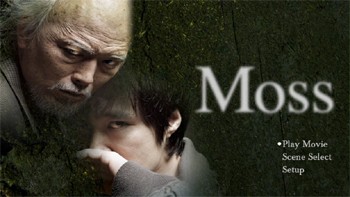 | 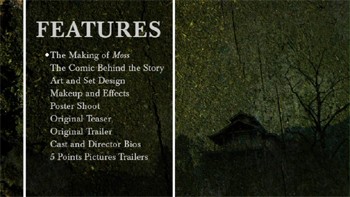 |
Video and Audio:
Rich greens, browns and blacks dominate the image in Moss, something I suppose one could expect given the title. What you might not expect is exactly how proficient this DVD can be: frequently, the 2.35:1-framed transfer sports excellent amount of detail, ample skin-tone balance, and a graceful range of motions through the image. A few close-ups are jaw-dropping, revealing the intricacy of the elder-driven make-up work, while daytime sequences often showcase robust detail and a capable eye for contrast. Now, during the nighttime sequences, contrast can get a bit muddy, obtrusive, and grainy, and some details appear flat to the eye, but all in all, we're working with a rather robust transfer here.
The Korean 5-channel Dolby Digital track isn't a slouch, either. Mostly a dialogue-driven film, Moss balances the often brusque, fluctuating dialogue with a capable grasp on the soundstage's breadth, frequently melding with background ambience to immensely successful ends. Occasional sound effects push through the front- and rear-channel arenas, such as billowing fire and the splashing of water, but mostly the track here focuses on staying clean and clear for the ebb-'n-flow of verbal clarity to stay stable. That, and the robust soundtrack, which becomes the audio design's most prominent source of lower-frequency activity -- often pulsating on the lower-end of things. Some vocal elements get hampered down by the track's limitations and a few effects feel a bit flat, but aside from that, it gets the job done rather well. The English subtitles are exceptionally well-handled, with nary an instance of grammatical issues to be found.
Special Features:
 The Making of Moss (1:03:02, 4x3):
The Making of Moss (1:03:02, 4x3): As with most of these lengthier pieces, expansive behind-the-scenes stretches are edited together with interviews with the cast and crew. The content stays mostly on the surface, really, but there's a bit of material worth really paying attention to, such as when Yun Tae-ho discusses the diverting directions of the material and how Kang Woo-suk stayed the course with his vision -- making sure it didn't "wander off". You'll see the director at-work in the off-camera shots, as well as the make-up effects applied to Jeong Jae-yeong to give him his elder appearance.
A series of other featurettes touch on various topics about Moss: The Comic Behind the Story (4:48, 4x3) discusses the path artist Yun Tae-ho traveled from learning about Kang Woo-suk to being assured he was the right director; Art and Set Design (7:21, 4x3) reveals some of the extensive set construction and detailing; and Make-Up and Effects (8:36, 4x3) mostly covers the transformation of the actors from the young versions of themselves to the elder versions. Also available are a video capturing the Poster Shoot (2:25, 4x3) for the film's eerie promo materials, Cast and Director Bios, and an Original Teaser (:50, 4x3) and Original Trailer (1:14, 4x3).
Final Thoughts:
Moss is a rich, complex mystery-thriller about persuasion, morality, and hidden secrets tucked away in a village that's willingly separated from the rest of the world. The pacing never halts across its over two-and-a-half hour time with the audience; sporting an eerie, kinetic energy driven by the village' mysteries and the main character's push to unearth them, Kang Woo-suk's adaptation of a Korean webcomic sustains a constant, compelling stream of intrigue from start to finish, even though it's unable to fully resolve the hard-hitting themes of cultish indoctrination and redemption that it prances around. Deft performances and an unyielding atmosphere boost its energy all the way to its jumbled climax. Definitely worth the time, though it doesn't pack the same punch as some of its grittier, more provocative and stimulating contemporaries. Recommended.
|
| Popular Reviews |
| Sponsored Links |
|
|
| Sponsored Links |
|
|
| Release List | Reviews | Shop | Newsletter | Forum | DVD Giveaways | Blu-Ray | Advertise |
|
Copyright 2024 DVDTalk.com All Rights Reserved. Legal Info, Privacy Policy, Terms of Use,
Manage Preferences,
Your Privacy Choices | |||||||









